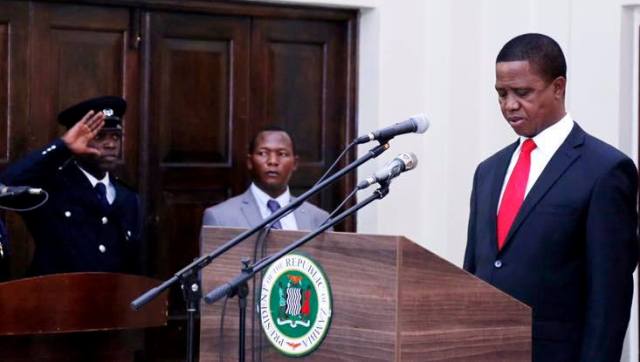 Emergency powers were invoked by the Zambia's President Edgar Lungu in early July. [photo: Edgar Lungu's Facebook]
Emergency powers were invoked by the Zambia's President Edgar Lungu in early July. [photo: Edgar Lungu's Facebook]
Emergency powers were invoked by the president, Edgar Lungu, after a spate of suspected arson attacks on marketplaces and courthouses, including a fire that razed a third of Lusaka’s City Market, the country’s largest, on 4 July hours after another market burned down. There have also been attacks on electricity pylons, the Lusaka Times reported. The emergency legislation allows the government to ban public gatherings, impose curfews, curtail parliament, ban publications, detain without trial and search properties without warrants. ‘If it means suspending human rights then we will suspend human rights,’ Lungu warned. ‘If I become a dictator for once, bear with me.’
MPs of the ruling Patriotic Front (PF) approved the 90-day state of emergency but opposition MPs boycotted the National Assembly vote, calling it a government ploy to increase its powers after a disputed election, Reuters reported. Lungu was re-elected in 2016 in a closely contested vote that was rejected by the United Party for National Development (UPND), led by Hakainde Hichilema. In the previous election in 2015, Hichilema was defeated by Lungu by just 30,000 votes.
Geoffrey Mwamba, UPND vice-president, said the emergency decree ‘constitutes abuse of power designed to silence his critics and kill democracy,’ al-Jazeera reported. ‘It is clear that [Lungu’s] actions are premeditated and designed to strengthen the hand of dictatorship,’ he said. ‘It’s an exaggerated and unnecessary step [and] a basis upon which to oppress the opposition further,’ Bradford Machila, a lawyer and former cabinet minister, told the Financial Times.
Lungu said the emergency powers might be lifted before they expire if ‘acts of sabotage’ ceased. However, his government was ratcheting up the rhetoric, The Mast reported, with the home affairs minister, Steven Kampyongo, saying those sabotaging the electricity system ‘should be ready to pick up corpses from the pylons’ and if it took killing people to preserve the peace, then ‘so it shall be’. The energy minister, David Mabumba, called for the ‘terrorists’ to be killed as the US had done with Osama bin Laden.
Invoking the emergency powers followed months of rising tensions. In March PF members, some armed with machetes, occupied the offices of the Law Association of Zambia looking for the head of the organisation over her supposedly pro-opposition stance. Machila said then: ‘The rule of law has collapsed.’ Hichilema, known as HH, was arrested and charged with treason the following month for allegedly obstructing Lungu’s motorcade when he ‘disobeyed police orders to clear the way, putting the life of the head of state in danger’, according to the police chief, Kakoma Kanganja. In June friction between PF and UPND supporters erupted into a brawl at a cemetery in Lusaka. After their case was adjourned in May, the human rights organisation Amnesty International said Hichilema and five people in his UPND entourage were undergoing ‘persecution through prosecution’ and called for charges to be dropped. ‘Their arrest and detention is part of a cynical ploy to silence all political opposition in Zambia,’ Amnesty said. Nic Cheeseman, of Birmingham University, told the FT that the state of emergency was ‘effectively a way of securing powers to keep HH in jail’. In June the speaker of the National Assembly suspended 48 opposition MPs who had boycotted Lungu’s address to the legislature in a protest over the election result, the Zimbabwe Herald reported.
After invoking emergency powers, Lungu claimed: ‘The theory [by opposition parties] is that they put pressure so we begin renegotiating the result of the last elections. There is a deliberate ploy by the opposition … We won the elections and the winner takes it all. Their idea was to create terror and panic.’
The need for a bailout by the International Monetary Fund could be a more important restraint on Lungu’s authoritarian tendencies than the opposition, media or human rights groups. It is significant that Article 31 of the constitution – a declaration relating to threatened emergency – was invoked rather than Article 30’s actual declaration of a public emergency. Cheeseman suggested in Quartz: ‘[Lungu] will have secured powers to consolidate his political control while generating “plausible deniability” as to whether or not he has fatally undermined Zambian democracy.’
In April, the UPND chair, Mutale Nalumango, called the mysterious fires ‘a ploy by the government to cause a state of emergency which will result in a one-party state’. Three months later, after these powers were invoked, the South African Mail & Guardian concluded: ‘The assertion, out of context, would appear to be little more than an abject conspiracy theory. However, as previous reports explored, Lungu has made significant ground in purging Zambia of any effective opposition to his regime.’
Referring to the United National Independence Party, which ruled Zambia from 1964 to 1991 under Kenneth Kaunda, Chris Phiri warned in Zambia Reports that the state of emergency ‘would set us way back in the dark UNIP days … the country still bears the scars of a one-party dictatorship.’
In a remarkably outspoken statement, the Zambia Conference of Catholic Bishops called for cross-party dialogue, criticised the politicisation of the police and declared: ‘Our country is now all, except in designation, a dictatorship.’



